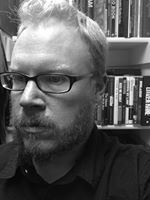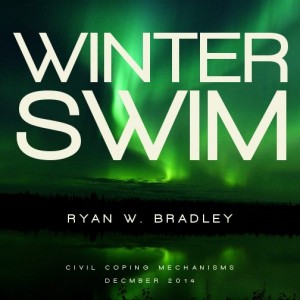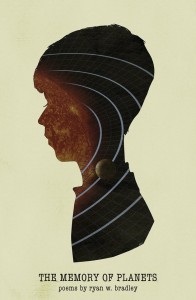 We are pleased to welcome Ryan W. Bradley to this month’s Writers on Craft. Ryan W. Bradley has pumped gas, changed oil, painted houses, swept the floor of a mechanic’s shop, worked on a construction crew in the Arctic Circle, fronted a punk band, and managed an independent children’s bookstore. He now designs book covers. He is the author of four poetry chapbooks, three full-length poetry collections, including The Waiting Tide, and a collaborative collection with David Tomaloff. He is also the author of a story collection, and Code for Failure, his debut novel. A novella, Winterswim is forthcoming in late 2014. He received his MFA from Pacific University and lives in Oregon with his wife and two sons.
We are pleased to welcome Ryan W. Bradley to this month’s Writers on Craft. Ryan W. Bradley has pumped gas, changed oil, painted houses, swept the floor of a mechanic’s shop, worked on a construction crew in the Arctic Circle, fronted a punk band, and managed an independent children’s bookstore. He now designs book covers. He is the author of four poetry chapbooks, three full-length poetry collections, including The Waiting Tide, and a collaborative collection with David Tomaloff. He is also the author of a story collection, and Code for Failure, his debut novel. A novella, Winterswim is forthcoming in late 2014. He received his MFA from Pacific University and lives in Oregon with his wife and two sons.
What do you read when you despair at the state of either your work or modern literature—any “go to” texts?
The only thing to do when I despair at the state of my own work is to keep looking at it, as painful as that can be. Reading other writers can only make me feel worse. I can’t tell you how many times I go to bed thinking about how shitty of a writer I am, but like many feelings in life, these moments drift and are interchangeable with moments of pride and even arrogance about my writing. If I make myself keep going back to it I know that the roller coaster will stay on the tracks and I’ll see the same things I’ve seen before as I go past.
Beyond my work I don’t know that I despair at modern literature at all. But there are writers who make me love the world more than the world deserves to be loved at times. Neruda, for sure, but even writers who were far less hopeful, like Raymond Carver. I tend to re-read writers for the way they make me feel, the way my chest is split open taking in the sentences, the way I writhe in envy at their sheer ability.
If you could give just one piece of advice to emerging authors about editing that has served you well, what would it be?
 Don’t be dismissive. If you’re having a hard time nailing a piece, or if you are given advice or criticism that is hard to take in, don’t write it off, don’t ignore it, don’t shy away from it. Go on a bender if need be, but go back to the work afterward. Don’t make the mistake of thinking your work can’t be improved because 99% of the time it can be, and that’s not a knock, it’s just a fact. Everything can get better, so why not help it get there? Stop worrying about how much you’re producing or about producing at all. Worry about creating something that is worth creating.
Don’t be dismissive. If you’re having a hard time nailing a piece, or if you are given advice or criticism that is hard to take in, don’t write it off, don’t ignore it, don’t shy away from it. Go on a bender if need be, but go back to the work afterward. Don’t make the mistake of thinking your work can’t be improved because 99% of the time it can be, and that’s not a knock, it’s just a fact. Everything can get better, so why not help it get there? Stop worrying about how much you’re producing or about producing at all. Worry about creating something that is worth creating.
How has your perception of what you “do” with your work changed as you have continued to write?
I take myself less seriously all the time. When I think about how seriously I used to take myself, take my writing, it makes me sad. I wasted so much time on that. You can write serious stories, poems, whatever, without taking it seriously. It’s life, it’s art, but that’s it: life and art. I beat myself up constantly about my writing but at least I’m learning that it’s okay to step back, to say I want to have fun again. I don’t want writing to be a labor of love or hate. I want it to be a craft that I enjoy, the way I enjoy other artistic endeavors, like designing book covers. It’s rare for designing a cover to not be fun. And it’s definitely hard to not take the “pursuit” part of writing seriously, and I still do often. I get down or jealous or frustrated, but I’m getting a little better at letting go.
What do you feel is the purpose of literature?
I struggle with this, and maybe in part because I don’t take it seriously anymore, but I’m not sure that literature or art in general needs to have a purpose. And if it does have a purpose it’s too esoteric, for the sake of inspiration, aesthetic pleasure, beauty, and yes, even though some writers don’t want to hear it: entertainment. People wouldn’t still be reading books if they didn’t enjoy them. And like it or not that base enjoyment isn’t a product of some deep analysis or high-minded relationship with humanity and the universe. No, it’s much more primal. Enjoying something that has “artistic merit” doesn’t make it any less a form of entertainment, it just means you’re attracted to different aesthetics than the people you think have “low-brow” tastes. We’re all seeking entertainment.
As a human being, what is the best advice you have to offer?
I think the not taking yourself seriously thing works here, too. But really I’m a deeply flawed human who is constantly trying to evolve and make my way through life. Louis CK has this riff about people saying life is short. “No it’s not,” he says, “it’s long. It’s really long.” And really that’s all the more reason to try and do what you love to do and be around who you like being around. That’s what’s going to make the days worth it as they pile up.
Your creative work spans fiction and poetry, among other things. If you had all the time in the world to work strictly on your creative work, which new projects would you pursue and why? Also, can you speak to how being a poet has impacted your prose here—what you feel each genre gives and takes?
 There are a lot of things I want to write, things that may never be fully realized not only because of time, but because of psychological motivation maybe. If I had all the time in the world for these endeavors I would no doubt finish more of them than otherwise, but I would probably also spend more time on other creative work. I always wanted to be a filmmaker and I think I would pursue that more if I had the time, it brings together a lot of my artistic interests into a single medium and I think that I could do something I would feel proud to create.
There are a lot of things I want to write, things that may never be fully realized not only because of time, but because of psychological motivation maybe. If I had all the time in the world for these endeavors I would no doubt finish more of them than otherwise, but I would probably also spend more time on other creative work. I always wanted to be a filmmaker and I think I would pursue that more if I had the time, it brings together a lot of my artistic interests into a single medium and I think that I could do something I would feel proud to create.
As for the poetry/prose issue, I’m not sure what crosses over between the two for me. I’ve always been a pithy writer, sometimes to a fault, and it would be convenient to say that came from starting out in poetry, but I don’t think that’s necessarily true. It’s likelier to have come out of being impatient and blunt, just as my tendency to write uniformly short lines of poetry comes out of obsessive-compulsive issues.
Poetry feels more personal in some ways, mostly because I fall very easily into writing in the first person. Fiction for me is more of a true excursion, a commitment to a journey even in the shortest of stories. I’m sure both have had impacts on the other, but they also seem to occupy separate portions of my brain as I rarely am able to write them both during the same periods of time. I tend to go on streaks of one or the other.
What’s recently released or in the pipeline for your readers? Give us a sneak peek.
My third full-length poetry collection, The Memory of Planets, has recently been released, but I’m gearing up for the release of my novella, Winterswim in December from Civil Coping Mechanisms. I’m excited because it’s my first fiction to be released since my novel, Code for Failure and they are drastically different books. While Code for Failure was an autobiographical exploration of factotum storytelling, Winterswim is a twisted story about religion, mythology, sex, death, drugs, and my home state of Alaska. I’m also very fortunate that in addition to the print version Winterswim will be released as an audiobook by Blackstone Audio and that’s very exciting. Beyond that I am holding out hope that my second novel, A Hard Place to Die, and my baby, an Alaska-set story collection called Nothing but the Dead and Dying, will find homes.
____________________________________________________________
Writers on Craft is hosted by Heather Fowler, who cares about writing. She does a lot of it. Visit her profile on Fictionaut or see here for more: www.heatherfowlerwrites.com.
Jun 4th, 2014 at 8:49 am
“And if it does have a purpose it’s too esoteric, for the sake of inspiration, aesthetic pleasure, beauty, and yes, even though some writers don’t want to hear it: entertainment.”
Lovely to read all of this, but especially wonderful to read this above statement. I’ll be fast to stand up with Ryan on this one and many other points he made here.